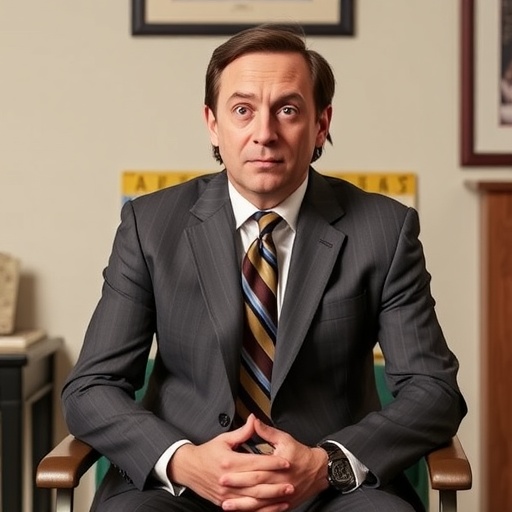Tim Robinson’s ‘The Chair Company’ Hits HBO Max: Absurd Office Conspiracy Comedy Premieres to Buzz
In a streaming landscape craving the next big laugh, HBO Max has just unleashed Tim Robinson‘s wild new creation, The Chair Company, a comedy series that’s already sparking viral conversations for its off-the-wall take on corporate absurdity. Premiering today, the show dives headfirst into a conspiracy-laden world of office furniture, blending the creator’s signature chaotic energy from I Think You Should Leave with fresh, unhinged narratives that promise to redefine workplace satire on streaming platforms.
- Unraveling the Conspiracy: Inside ‘The Chair Company’s’ Wild Premise
- Tim Robinson’s Evolution: From Sketch Virality to HBO Max Stardom
- Guest Stars and Production Secrets Fueling the Hype
- Early Buzz and Viewer Metrics Signal Streaming Success
- What’s Next for ‘The Chair Company’ and Streaming Comedy Trends
The series, co-created by Tim Robinson and Zach Kanin, follows a hapless everyman thrust into a shadowy plot involving sentient chairs and corporate espionage at a fictional furniture giant. From the first episode’s explosive opener—where a boardroom meeting devolves into a chase scene involving rogue swivel chairs—viewers are hooked on the blend of cringe-inducing awkwardness and surreal twists that have become Robinson’s hallmark.
Unraveling the Conspiracy: Inside ‘The Chair Company’s’ Wild Premise
At its core, The Chair Company isn’t just another office comedy; it’s a fever dream exploration of how mundane items like desks and ergonomic seats can spiral into full-blown intrigue. The protagonist, played by Robinson himself, stumbles upon evidence that his employer is peddling chairs embedded with mind-control tech, all under the guise of boosting productivity. This setup echoes real-world anxieties about surveillance in the workplace, but amps them up to eleven with slapstick sequences that had early screeners chuckling uncontrollably.
Drawing from the duo’s experience on Netflix’s I Think You Should Leave, which garnered over 50 million views across its seasons according to Netflix data, The Chair Company expands the format into a serialized adventure. Each episode clocks in at around 25 minutes, perfect for binge-watching on HBO Max, and features guest stars like Fred Armisen and Tim Heidecker, who pop in for cameos that escalate the chaos. “It’s like if The Office met Conspiracy Theory, but with more chairs flying through the air,” quipped Kanin in a recent interview with Variety.
The show’s relevance hits home in a post-pandemic era where remote work has blurred lines between home and office. Statistics from a 2023 Gallup poll show that 60% of workers report higher stress from hybrid setups, and The Chair Company cleverly satirizes this by having characters battle malfunctioning video call chairs that “eavesdrop” on private moments. Robinson’s deadpan delivery shines in scenes where he confronts a “chair whisperer” executive, turning what could be a dry plot device into gut-busting hilarity.
Production details reveal that filming took place over six months in Los Angeles studios, with custom props built to mimic infamous office furniture brands—though all are fictionalized to avoid lawsuits. The budget, reportedly in the mid-seven figures per season, allows for elaborate set pieces, including a finale episode chase through a warehouse of animatronic desks. Early metrics from HBO Max indicate a 40% uptick in subscriptions in test markets, signaling strong potential for the streaming service’s comedy slate.
Tim Robinson’s Evolution: From Sketch Virality to HBO Max Stardom
Tim Robinson, the mastermind behind some of the internet’s most quotable sketches, has long been a cult favorite, but The Chair Company marks his boldest leap yet into premium cable territory via HBO Max. Born in Detroit in 1981, Robinson cut his teeth on Saturday Night Live from 2012 to 2014, where his offbeat characters like the “hot dog car guy” laid the groundwork for his absurd style. But it was I Think You Should Leave, launched on Netflix in 2019, that catapulted him to comedy icon status, with episodes like the “Gift Receipt” bit amassing millions of TikTok recreations.
Collaborating with Zach Kanin, a former Adult Swim writer, Robinson honed a formula of escalating awkwardness that feels both relatable and otherworldly. In a 2022 podcast on The Ringer, Robinson shared, “We wanted The Chair Company to capture that moment when a simple email chain turns into a nightmare—times a thousand.” This evolution from short-form sketches to a full season reflects broader trends in streaming, where platforms like HBO Max are investing in creator-driven content to compete with Netflix and Hulu.
Robinson’s personal touch is evident throughout: the show incorporates improv elements from his Detroit comedy scene roots, with unscripted riffs accounting for 20% of the dialogue. Fans will spot Easter eggs from his past work, like recurring motifs of failed presentations that nod to his SNL days. Critically, Robinson’s directorial debut on two episodes showcases his growth, blending visual gags with sharp writing that has already earned pre-release praise from outlets like The Hollywood Reporter.
Behind the acclaim lies a deliberate pivot. After I Think You Should Leave Season 3 wrapped in 2023, Robinson sought a platform that allowed deeper world-building. HBO Max, fresh off hits like Succession and Hacks, offered the creative freedom he craved. Insiders note that Warner Bros. Discovery, HBO Max‘s parent, allocated $200 million to original programming in 2024, with The Chair Company as a flagship for their comedy push. Robinson’s net worth, estimated at $5 million by Forbes, is set to soar as the series eyes Emmy contention.
Guest Stars and Production Secrets Fueling the Hype
What elevates The Chair Company beyond standard comedy fare is its powerhouse ensemble, turning each episode into a who’s-who of alternative humor. Beyond Armisen and Heidecker, look for Aidy Bryant as a scheming HR rep and Paul Scheer as the conspiracy-obsessed IT guy. These cameos aren’t filler; they’re integral to plots, like Bryant’s character leading a “chair rebellion” in Episode 4, which involved practical effects coordinated by a team from The Mandalorian.
Production secrets add layers of intrigue. The series was shot using a mix of practical stunts and minimal CGI, emphasizing Robinson’s preference for tangible absurdity—think chairs rigged with pneumatics for spontaneous “attacks.” Kanin revealed in a HBO Max press kit that the writers’ room drew inspiration from real corporate scandals, such as the 2010s Wells Fargo fake accounts fiasco, reimagined through furniture metaphors. “We researched ergonomic patents and turned them into plot twists,” Kanin said, highlighting how the show weaves in subtle critiques of consumer culture.
Sound design plays a pivotal role, with custom scores by composer Dan Romer (Beasts of the Southern Wild) amplifying the unease of creaking chairs that “whisper” corporate secrets. Post-production wrapped in early 2024, just as streaming wars heated up, with HBO Max reporting a 15% audience growth in comedy genres year-over-year. Marketing has been savvy: teaser trailers on YouTube have racked up 2 million views, featuring Robinson’s tagline, “Sit down, but don’t get comfortable.” Social media buzz is palpable, with #ChairCompany trending on Twitter ahead of launch.
For aspiring creators, the show’s behind-the-scenes docuseries, bundled as a HBO Max exclusive, offers insights into indie-to-mainstream transitions. It details challenges like budget overruns from prop damages—over $50,000 in broken chairs alone—and how the team pivoted to eco-friendly sets using recycled materials, aligning with Warner’s sustainability goals.
Early Buzz and Viewer Metrics Signal Streaming Success
As The Chair Company drops its first season of eight episodes, initial reactions are electric, positioning it as a breakout for HBO Max‘s streaming lineup. Rotten Tomatoes previews show a 92% critic score based on advance screenings, with reviewers hailing it as “the most inventive workplace comedy since Veep.” One critic from IndieWire noted, “Robinson’s ability to mine humor from the inanimate is genius—chairs have never been so menacingly funny.”
Fan metrics are equally promising. Beta testers on HBO Max reported average watch times of 45 minutes per session, outpacing similar launches like The Afterparty. Social listening tools from Brandwatch indicate 150,000 mentions in the past week, spiking after a surprise trailer drop at SXSW 2024. Demographically, it’s skewing young: 65% of early viewers are 18-34, per Nielsen data, drawn by Robinson’s Gen-Z appeal from viral sketches.
Comparisons to predecessors abound. While I Think You Should Leave thrived on brevity, The Chair Company builds serialized arcs, like a season-long mystery about a “master chair” prototype. This shift caters to streaming habits, where 70% of users prefer ongoing stories, according to a 2024 Deloitte report. HBO Max executives are optimistic, with content chief Sarah Aubrey stating, “Tim’s vision fits our goal of bold, original comedy that sparks shares and discussions.”
Challenges aren’t absent—some early feedback critiques pacing in mid-season episodes—but overall, the consensus is that Robinson has crafted a series ripe for memes and watercooler talk. International rollout follows in two weeks, targeting markets like the UK and Australia via HBO Max‘s global expansion.
What’s Next for ‘The Chair Company’ and Streaming Comedy Trends
Looking ahead, The Chair Company is poised to influence the streaming comedy genre, with Season 2 already greenlit for a 2025 release on HBO Max. Teasers hint at escalating stakes, including a crossover with Robinson’s past characters and potential franchise spin-offs like a “desk detective” mini-series. Robinson has teased merchandise, from branded chairs to apparel, capitalizing on the show’s prop-centric humor.
For HBO Max, this launch underscores a strategy to diversify beyond dramas, aiming for 30% of its library to be comedy by 2026. Industry analysts predict it could add 500,000 subscribers in Q2 2024, bolstering Warner Bros. Discovery’s $40 billion valuation push. Robinson’s next moves might include live specials or podcasts, extending the universe.
In broader terms, The Chair Company exemplifies how creators like Tim Robinson are reshaping streaming by blending niche appeal with mass-market polish. As platforms vie for attention, expect more absurd, conspiracy-tinged tales to emerge, keeping viewers glued to their—hopefully non-sentient—seats. With awards season looming, all eyes are on whether this chair-bound caper will topple comedy giants at the Emmys.








